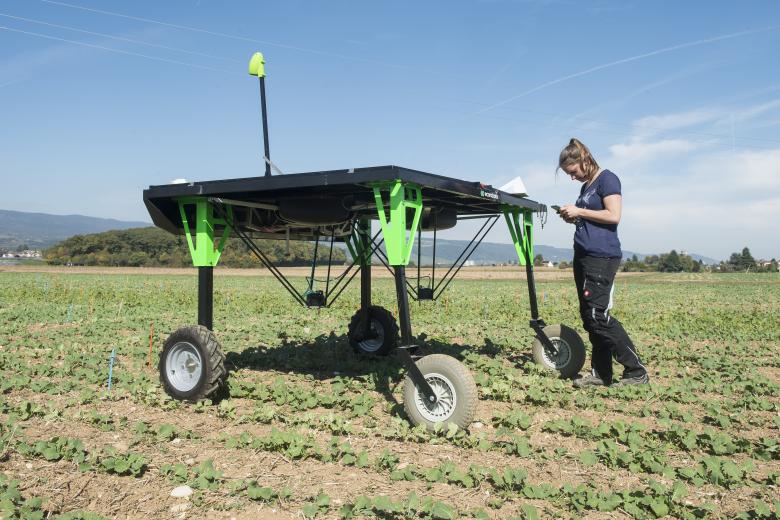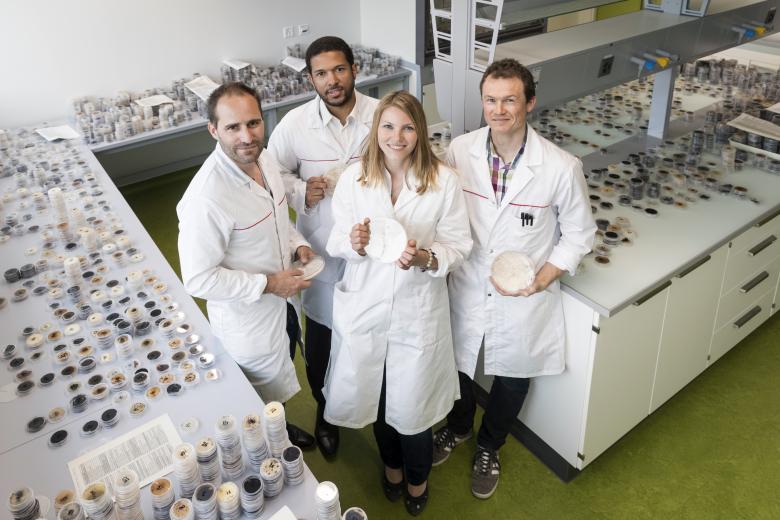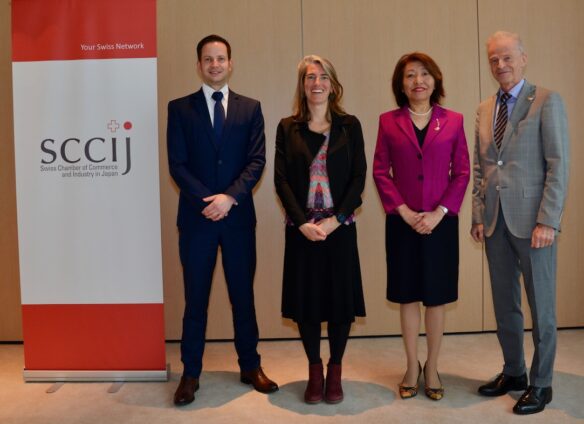Tokyo (SCCIJ) – Swiss start-up companies are working with the scientific community to develop technological innovations that enable more sustainable farming practices. In particular, ecoRobotix, Vivent, and AgroSustain have risen to the challenge of combining innovation, economic growth, and environmental protection. These young companies are active in the Green Tech market, which emerged around ten years ago, developing environmentally friendly technological solutions. They all began life in Switzerland but have set their sights beyond its borders.

Agroscope, the Swiss competence center for agrarian research, is conducting tests with the ecoRobotix machine in Changins, in the canton of Vaud (©Agroscope, Carole Parodi)
Using robots to tackle weeds
A solar-powered robot that uses GPS to navigate autonomously, scanning the fields with its integrated camera and deploying two mechanical arms to apply small doses of herbicide to weeds. This machine was created by ecoRobotix, a company founded by Aurélien Demaurex and Steve Tanner in 2011. The adventure began in Mr. Tanner’s barn before moving to the Y-Parc technopark in Yverdon-Les-Bains in the canton of Vaud.
Having secured funding, the team has now expanded to 20 people developing different versions of the robot. “We’ve always aimed to innovate by designing environmentally friendly technology to promote more sustainable farming,” says Mr. Demaurex. The robot’s targeted weeding should reduce herbicide use by 90% while limiting soil compaction and protecting soil life.
To improve the robot’s efficiency, the company has joined forces with institutes such as Agroscope and the Swiss College of Agriculture in Zollikofen in the canton of Bern. “We’re currently conducting trials to use the robot for weeding,” explains Didier Pellet, head of Agroscope’s ‘Varieties and production techniques’ research group. This farming method involves loosening the soil and then lifting the weeds, which makes the robot’s job easier as it means fewer stops to apply the herbicide.

Thanks to Vivent’s device, we can now understand the language of plants (©Vivent)
Deciphering the language of plants
Plants have their language, and the Vivent start-up is determined to decipher it. The company has developed the Phytl Signs device, which interprets plants’ biological signals. Two electrodes placed on a leaf measure the electricity the plant produces. The electrical signal is amplified, and Vivent’s device converts it into a digital signal. As with a cardiogram, the data appears on a computer or smartphone screen connected to Phytl Signs.
The start-up’s new technology has what it takes to entice vegetable growers. With the help of artificial intelligence, the plants’ biosignals can be decoded before insect attacks or disease appear to the naked eye. This prompt action means one can avoid pesticides and instead opt for organic alternatives. The company has demonstrated Phytl Signs’ effectiveness in measuring electrical signals in vegetables grown in a commercial greenhouse.
“We’re currently also studying data on the vegetables’ water requirements to fine-tune the irrigation,” adds Mr. Tran. The aim is to reduce a natural resource on which greenhouse farming is mainly dependent. As the next step, the start-up expands its vast database and create a ‘dictionary’ that Vivent’s device can draw on for an accurate translation of the language of plants.

AgroSustain CEO, Olga Dubey, with Sylvain Dubey and Jean-Pascal Aribot, co-founders of the company, and Sylvain Schnee, an Agroscope researcher (© AgroSustain)
Curbing food waste
Every year, 1.3 billion tons of food for human consumption is wasted around the world, corresponding to one-third of the total food produced. This is also a significant waste of resources, such as water and farming land. It is also a substantial source of greenhouse gas emissions.
AgroSustain, a company set up in 2017 by biologist Olga Dubey, her husband Sylvain Dubey, and engineer Jean-Pascal Aribot is tackling this significant environmental challenge. “We’ve developed a solution to counter the loss of harvested fruit and vegetables to fungal diseases such as gray mold,” explains CEO Ms. Dubey.
AgroShelf+, AgroSustain’s ‘miracle’ product, combines the antifungal properties of two molecules that occur naturally in plants to extend the shelf life of food in storage by approximately one week. “Of course, the recipe is a secret,” Ms. Dubey says. The product is a well-kept secret with an international patent and a potential market release date scheduled for 2022.
Text and photos: ©House of Switzerland, editing by SCCIJ





























